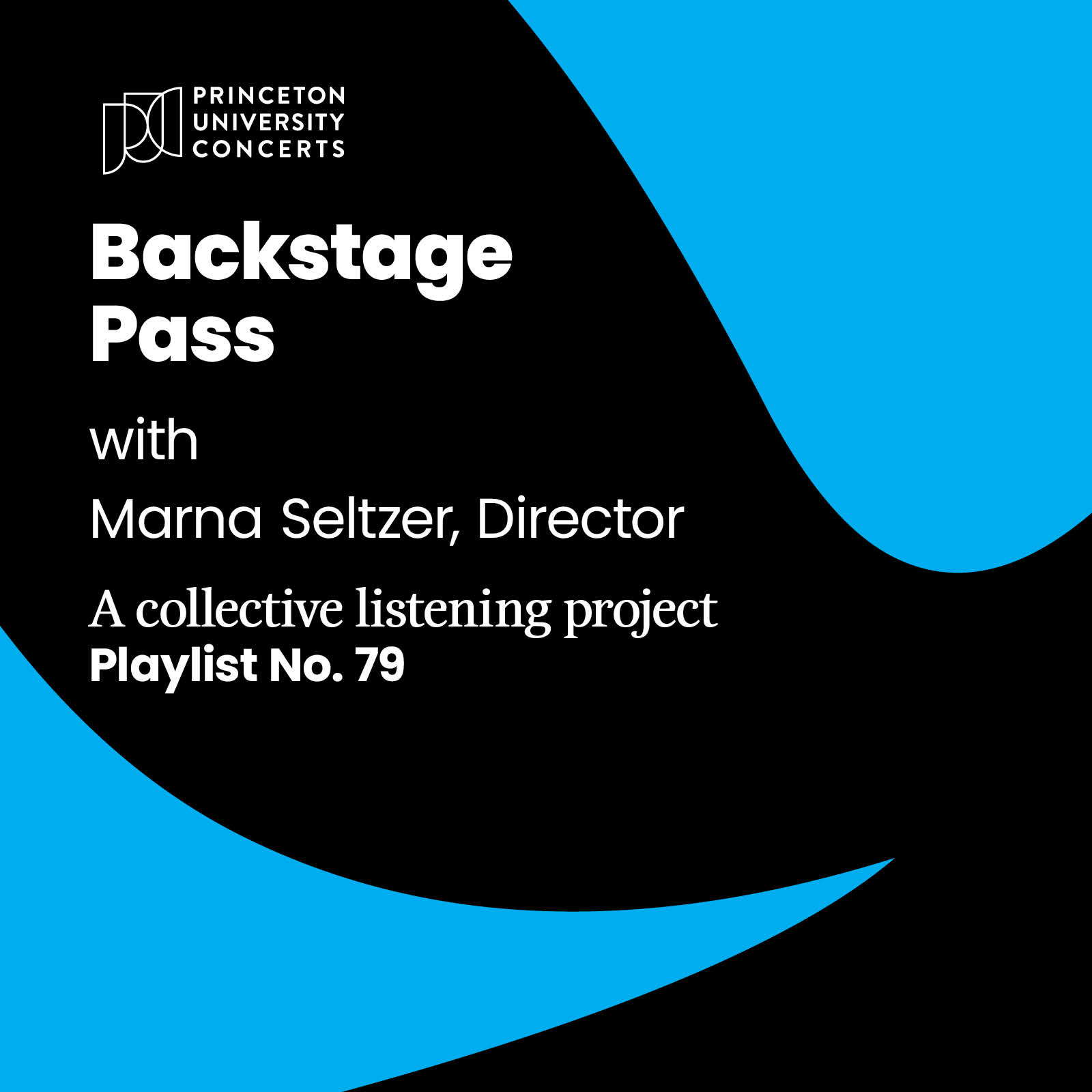Welcome to our 2024-2025 season!
Special Playlists
Marna Seltzer’s Backstage Pass: Deluxe Subscriber Playlist
Marna Seltzer’s Backstage Pass
About the Playlist
July 29, 2024

Princeton University Concerts Director Marna Seltzer curated this playlist as a bonus for our 2023-24 Deluxe Subscribers, featuring some of the tracks that she holds most dear:
Dear Friends,
Some of my earliest memories are of playing the violin with my mother. I began taking lessons at six, and she and I would attend Suzuki camp in Steven’s Point, Wisconsin together. During “play-ins,” when the entire camp would play through the Suzuki music books, it was usually the youngest kids who made it through to the end of the event. I revered them. When I was ten, my parents took me to see the Suzuki players from Tokyo, conducted by Dr. Shinichi Suzuki, at Orchestra Hall (now Symphony Center) in Chicago. I poured over the glossy souvenir program for hours, imagining which girl I wanted to be.
TRACK 1: Most students of the famous Suzuki method don’t realize that its founder was a great violinist / First movement of the Franck Violin Sonata in A Major, Shinichi Suzuki, Violin; Manfred Gurlitt, Piano
At Interlochen Summer Music Camp, one of my favorite traditions was “roll call,” the day when all the campers gathered in Kresge Auditorium’s 3900 seats and stood when the name of their state or country was called. Talk about one’s world expanding. By the end of my first summer, I was convinced that I knew at least one person from every country in the world. In my cabin alone, there was a clarinet player from Lebanon, a dancer from India, and a harpist from Panama. That first summer, and the four that followed, I was required to attend a concert every night. Reflecting on the talent I was exposed to makes me gulp. I heard performances by pianist Van Cliburn who, by then, rarely played in public; jazz pianist and composer Dave Brubeck; clarinetist Benny Goodman; and violinist Itzhak Perlman. Even though close to 50 concerts a summer sometimes seemed like a chore to a ten-year-old, I had already found the experience that would define my life’s choices and the kind of moments I would seek out for the rest of my life.
TRACK 2: When Van Cliburn won the first International Tchaikovsky Competition in 1958 his performance earned him a standing ovation lasting eight minutes! He returned home to a ticker-tape parade in New York City, the only time the honor has been accorded a classical musician / First movement of Tchaikovsky Concerto No. 1 in B-flat Major, Op. 23; RCA Symphony, conducted by Kirill Kondrashin.
TRACK 3: Take Five by Dave Brubeck is one of the few pieces in the jazz repertoire to have the unusual time of 5/4, hence the double meaning of the title, which in English means “taking five minutes off” but also hints at the rhythmic tempo of the piece.
TRACK 4: Those who know me well know that Itzhak Perlman has been a significant figure in my life. After hearing him live for the first time at age ten at Interlochen, my first job out of college was as his personal assistant! I always loved his performances of Fritz Kreisler’s music. Often, he would bring a huge stack of sheet music on stage and take requests from the audience. Fritz Kreisler’s “Liebesfreud” (“Love’s Joy”) was always a favorite, showcasing his iconic charm and rich sound. Hot tip: if you haven’t seen the documentary “Itzhak,” it’s available for streaming on Amazon Prime and it’s wonderful! / Itzhak Perlman, Violin; Sam Sanders, Piano
When I was thirteen, my family moved from the Midwest to Princeton and I began violin lessons at Juilliard Pre-College. Every Saturday morning I would take the 6:40AM train into the city, where I encountered peers who were far more talented than I was. Inspired to improve, I often visited the Princeton Record Exchange (which thankfully still exists!), where I listened to virtually every concerto ever written for violin. In college, I worked summers at the Marlboro Music Festival. One night I was on late concert hall duty when Rudolf Serkin, the legendary pianist and founder of the festival, came into the office. He took my hand and quietly asked if I would mind if he practiced in the hall while I was working. Sometimes when I tell that story, I still can’t believe it actually happened. After I said, “no, of course I wouldn’t mind,” I stayed at my desk until 2AM listening to him practice passages from Beethoven’s Choral Fantasy.
TRACK 5: At the Princeton Record Exchange I fell in love with the Brahms Violin Concerto in D Major, Op. 77 and with violinist David Oistrakh. I love the warmth of his sound. / David Oistrakh, Violin, Cleveland Orchestra, George Szell, Conductor
TRACK 6: Beethoven Choral Fantasy in C Minor, Op. 80 / Rudolf Serkin, Piano, New York Philharmonic, Leonard Bernstein Violin, Westminster Choir
I moved to Princeton in 2010 to take over as Director of Princeton University Concerts. I never would have imagined when I walked across the stage of Richardson Auditorium to receive my graduation diploma from eighth grade, that the same stage would become my professional laboratory 30 years later. But here I am, back in my hometown and on a campus where the Arts are thriving—and I couldn’t be luckier. There is no better place to be a presenter than at a university, where people are dedicated to learning, stretching, and growing, and where students, in particular, are at a formative time in their lives when they are ready and even expected to take risks. And there is no better job than bringing those experiences to life. I come to my job with a deep belief, rooted in my childhood experiences, that the Arts are a transformative force, capable of changing lives forever.
Over the last 14 years at PUC, there have been countless moments when I have been lifted outside of myself, transcended by the music, and yet, at the same time, deeply aware of our shared humanity. With the final notes of this playlist, I leave you with a few cherished memories from PUC concerts — moments that exemplify how the Arts are a world-opening experience. As a Deluxe Subscriber, you already understand this profound truth. I am beyond grateful for your enthusiasm. Please, share it with others and remind them that in these divided times, music plays an ever-more crucial role as a universal language of connection and a reminder of our common experiences. Together, let’s continue to celebrate and support the transformative power of the Arts, ensuring they remain a vibrant and essential part of our lives and our world.
TRACK 7: In 2017, we introduced Galician bagpiper Cristina Pato. Her dazzling musical virtuosity and fierce commitment to the music of her homeland, Galicia, Spain, had the entire audience on their feet, dancing the Muineira, Galicia’s national dance. The joy was palpable and I remember thinking that I wished the evening would never end. / Fandango: Prueba de Fuego; Cristina Pato, Galician Bagpipes; Edward Perez, Double Bass; Eric Doob, Drums
TRACK 8: We have been fortunate to host the Danish String Quartet many times. Part of what makes them so special is that they uniquely blend folk and classical traditions, often offering programs where Beethoven shares the stage with Scandinavian folk tunes, breaking the mold of traditional string quartet performances. Sonderho Bridal Trilogy is one of my favorite tracks from their CD Woodworks.
TRACK 9: The morning after the 2016 presidential election, singer-songwriter Gabriel Kahane packed a suitcase and embarked on a two-week, 8,980-mile train trip across the U.S. without a phone or internet. The result was a song cycle drawn from stories of his fellow travelers—an eloquent cry for reconciliation and an attempt to rediscover our collective humanity. He performed one of these songs as part of PUC’s 125th anniversary / 8980 from Book of Travelers
TRACK 10: Virtuoso Guzheng player Wu Fei and Grammy-winning banjo player Abigail Washburn grew up mastering different folk traditions—Chinese and Appalachian. Wu is a world-renowned guzheng virtuoso, a 2500-year-old string instrument which is a staple of Chinese folk music, while Washburn is celebrated for her reinterpretations of traditional Appalachian music. Together, they discovered a remarkable commonality between their musical traditions. They shared their story in an essay for PUC’s book, “Ways of Hearing.” “Water is Wide / Wusuli Boat Song” is a track from their CD, performed at PUC in 2018 during our 125th anniversary season.
TRACK 11: Syrian clarinetist and composer will make his PUC debut on September 26 on our Healing with Music series with a special project he calls “Home Within,” an audio-visual project with Syrian-Armenian visual artist, Kevork Mourad. In this work, art and music develop in counterpoint to each other, creating an impressionistic reflection on the Syrian revolution and its aftermath. The piece November 22 recalls the sounds of markets that existed behind Kinan’s parents’ place in Damascus. The date recalls a Thanksgiving dinner he was invited to, six years after he came to the United States. He has said that “The date marks the first time I felt at home away from home, and how ambiguous and how tricky that feeling is.”
P.S. I recommend another documentary that beautifully embodies all that I have written about here: “The Music of Strangers,” which the Princeton Garden Theatre will screen on September 25 (click here for more info). This film follows members of the Silk Road Ensemble as they gather in various locations worldwide, exploring how art can both preserve traditions and shape cultural evolution. It features several members of our PUC family of artists including bagpiper Cristina Pato, clarinetist Kinan Azmeh (September 24), kamencheh player Kayhan Kalhor (February 12 & February 13), Pipa player Wu Man (February 13), among others. I invite you to join me for this screening, and promise you won’t be disappointed.
With sincere thanks for your shared love of music,
Marna Seltzer



